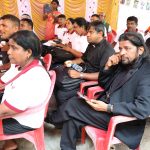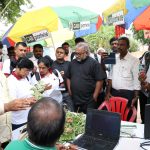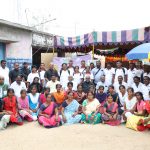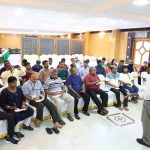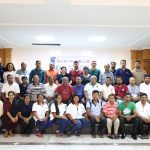A capacity Building excursion on the Village Knowledge Centers(VKCs) and Village Resource centers of MS Swaminathan Foundation (MSSRF), India was organized on June 16-21, 2023, from the Sustainable Agriculture and Food Security unit, under the Project “Addressing Causes for Poverty and Ensuring Food Security for Farming Communities” of Caritas Sri Lanka – SEDEC. There were 39 participants including the Rev. Fr. Luke Nelson Perera, National Director of Caritas Sri Lanka-SEDEC along with the Directors of the Regional Caritas Centers, National, & Regional coordinators, Diocesan Coordinators and field officers of the Food Security project team took part in the exposure program in the Village Resource centers set up by MSSRF in Pudukkottai and Thanjavur, Tamil Nadu, in southeastern India. The exposure visit was also followed with training on Climate Adaptive Approaches and Practices.
The community-involved practices of these centers were explained to the CSL team members by Dr. Rajkumar, Principal Scientist of MSSRF, and the VKC Management members. Caritas Sri Lanka team visited MSSRF to study the processes and the systems involved in establishing Village Knowledge Centers and the results achieved in terms of learning skills on various entrepreneurship for improving livelihoods of the communities in the project area, gathering information on various Government schemes and supporting in agricultural operations through integrated crop management and Integrated Pest Management by timely identification of the problems and intervening through plant clinics. The team gained knowledge on the systematic processes of setting up Village Knowledge Centers and Village Resource centers with the active involvement of the community and the way how the sustainability of these centers is ensured. The constant accompaniment of the MSSRF team and the training provided on the resources within the villages, conducting mapping and Participatory Rural Appraisal (PRA), needs assessment, plant clinic, identification of crop diseases, etc. improved the confidence and competency among the community members, especially the women. The interesting initiatives of plant clinics in magnifying the pest problems and crop diseases and appropriate and timely interventions to these problems helped farmers to increase the crop yield and hence increase their income.
Dr. Haridas V. R, the team leader of the Climate Justice division of Caritas India coordinated their stay at FEMINA Hotel, Tiruchirappalli, and the exposure visits in the project area of MSSRF near Pudukottai and Thanjavur. The training on practicable solutions to Climate Adaptive Approaches and Practices (CAAP) was handled by Dr. Haridas on 20.06.2023. Climate change is one of the greatest challenges facing the community. Mitigating global warming and adapting to its consequences will require major interventions and economic investment and constant technical support. With a challenge of this magnitude, multilateral cooperation is crucial, and a successful conclusion to the ongoing global negotiations on climate change would be the first step towards achieving sustainable development for future generations.
Climate change is not a problem that can afford to wait. It is a threat to future development, peace, and prosperity that must be tackled with the greatest sense of urgency by the entire community of nations and hence Caritas Sri Lanka can play a major role in climate adaptive practices. People are facing increasing threats as a result of climate change. Sea level rise, more intense hurricanes, changes in rainfall patterns, diminishing water availability, new health-related hazards, and other impacts are negatively affecting the livelihoods of the most vulnerable people. It is imperative to strengthen community resilience and local adaptive capacity. Social workers are in a unique position to help encourage this conversation at the micro, mezzo, and macro level. It is time that social workers take on this challenge and meet their ethical obligation to engage in environmentally just social work.


